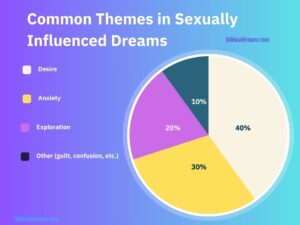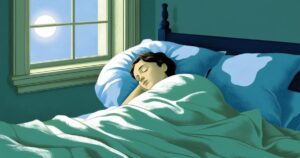Medications can profoundly affect both the quality of our sleep and the nature of our dreams. From vivid, sometimes disturbing dreamscapes to disrupted sleep cycles, many drugs—including antidepressants, beta-blockers, and sedatives—alter the way our brain cycles through sleep stages.

In essence, these medications can change the balance between REM and non-REM sleep, leading to modifications in dream intensity, frequency, and emotional tone.
Key Takeaways
- REM Sleep Disruption: Certain medications, such as SSRIs, can reduce REM sleep—an essential phase for vivid dreaming—by up to 30–50%, altering dream intensity and recall. citeNIHREM
- Vivid Dreams and Nightmares: Up to 25–30% of patients on some antidepressants and beta blockers report experiencing unusually vivid dreams or nightmares.
- Sleep Cycle Alterations: Medications can shift the balance of sleep architecture, often leading to fragmented sleep or reduced deep sleep stages, impacting overall cognitive and emotional recovery.
- Personalized Effects: The impact of medications on sleep varies widely among individuals, influenced by factors such as dosage, duration of use, and personal physiology.
Understanding Sleep Cycles
Sleep is composed of multiple stages, primarily divided into non-rapid eye movement (non-REM) sleep and rapid eye movement (REM) sleep.
- Non-REM Sleep: This includes stages 1 to 3, with stage 3 being deep sleep, crucial for physical restoration and memory consolidation.
- REM Sleep: Associated with vivid dreaming, REM sleep plays a vital role in emotional regulation and memory processing.
An optimal balance between these stages is essential for overall health. Disruption in this balance can lead to poorer cognitive function, mood disturbances, and altered dream experiences.
Related: How Sleep Disorders Impact Dreaming
How Medications Impact Sleep Architecture
Various medications influence sleep cycles in distinct ways:
Antidepressants (e.g., SSRIs)
- Effect: Often reduce REM sleep by 30–50%, leading to fewer but more intense or unusual dreams.
- Implication: Users may experience a decrease in the normal dream activity or conversely, a rebound of vivid dreams when the medication is discontinued.
Beta Blockers
- Effect: Commonly linked to nightmares and disturbed sleep patterns.
- Implication: Up to 25–30% of patients report experiencing vivid or frightening dreams while on beta blockers.
Sedatives and Hypnotics
- Effect: These drugs promote sleep onset but may alter the natural progression through sleep stages.
- Implication: While they can help with falling asleep, they might reduce the overall quality of REM sleep, thereby dulling dream recall.
Other Medications
- Antipsychotics and Stimulants: These can also modify sleep architecture, sometimes suppressing REM sleep or altering the continuity of sleep, resulting in fragmented sleep patterns.
Medications and Dream Content
The influence of medications isn’t limited to sleep structure alone—they also modify the content of dreams:
Get instant dream insights with our Free Dream Interpretation App
- Vivid Dreams and Nightmares: A significant percentage of patients report more intense dreams or nightmares when on certain medications. This phenomenon is linked to the way these drugs interact with neurotransmitter systems, particularly serotonin and norepinephrine.
- Emotional Tone: Medications that alter neurotransmitter levels can change the emotional quality of dreams, sometimes intensifying negative emotions or, in other cases, dulling overall dream intensity.
- Dream Recall: With alterations in REM sleep, the frequency and detail of dream recall can be affected—either enhanced through rebound effects or diminished during periods of suppressed REM sleep.
Related: Revenge Dreams
Statistical Insights and Research
- REM Sleep Reduction: Research indicates that SSRIs can reduce REM sleep duration by up to 50% in some patients, significantly impacting dream frequency and intensity. citeNIHREM
- Incidence of Vivid Dreams: Studies have found that approximately 25–30% of patients on beta blockers and certain antidepressants report experiencing unusually vivid dreams or nightmares.
- Sleep Fragmentation: Patients on sedatives or hypnotics often experience fragmented sleep, leading to a reduction in deep sleep stages and disrupted memory consolidation, as confirmed by clinical studies in sleep medicine journals.
Managing Medication-Induced Sleep Changes
If you suspect that your medications are affecting your sleep or dream patterns, consider these steps:
- Consult Your Physician: Never adjust your medication without professional guidance. Your doctor can evaluate whether alternative treatments or dosage adjustments might improve your sleep quality.
- Sleep Hygiene Practices: Establish a consistent sleep schedule, create a calming bedtime routine, and ensure your sleep environment is conducive to rest.
- Dream Journaling: Keeping a record of your dreams can help you track changes over time and discuss them with your healthcare provider.
- Mindfulness and Relaxation: Techniques such as meditation or deep-breathing exercises can improve sleep quality and potentially mitigate adverse effects on your dreams.
Conclusion
Medications play a pivotal role in altering both your sleep cycles and the content of your dreams. Whether through reducing REM sleep, causing fragmented sleep patterns, or intensifying dream content, the effects of these drugs are far-reaching. By understanding these impacts, you can better manage your sleep health and work with healthcare professionals to optimize both your medication regimen and overall well-being.





